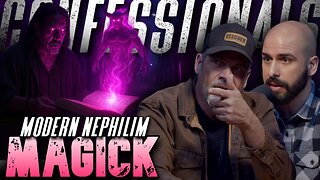Premium Only Content

BABOON HUNT with the Hadzabe Tribe
Join the Hadzabe Tribe on a thrilling baboon hunt, an age-old tradition that offers a unique insight into their ancient way of life. The Hadzabe Tribe is one of the last remaining hunter-gatherer communities in the world, residing in the remote areas of Tanzania, particularly around Lake Eyasi and the Serengeti Plateau.
Description of the Baboon Hunt:
1. Preparation: The hunt begins with meticulous preparation. The Hadzabe rely on their intimate knowledge of the land, animal behavior, and weather conditions. They often scout for baboon troops and observe their movements to determine the best time to strike.
2. Traditional Weapons: The Hadzabe use a variety of traditional weapons, including poison-tipped arrows and handcrafted bows. These weapons have been passed down through generations and are designed for precision and lethality.
3. Tracking: Once a suitable baboon troop is located, the hunters start tracking them stealthily. The Hadzabe possess extraordinary tracking skills, able to read signs left behind by the baboons such as footprints, broken branches, and other disturbances in the environment.
4. Ambush: Hunting baboons is a team effort. The hunters work together to strategically position themselves along the baboon's potential escape routes. This often involves hiding in bushes, trees, or behind natural cover.
5. Coordinated Attack: When the conditions are right, the Hadzabe launch a coordinated attack on the baboon troop. Their skilled archers shoot poison-tipped arrows with remarkable accuracy, aiming to incapacitate the baboons quickly.
6. Ethical Considerations: The Hadzabe's traditional hunting methods are designed to minimize suffering and ensure that the animals they hunt are treated with respect. While the poison-tipped arrows are lethal, they aim to bring down the animal swiftly.
7. Communal Sharing: Once a baboon is successfully hunted, the Hadzabe share the meat among the members of the community. This communal sharing reflects their strong sense of cooperation and interdependence.
8. Cultural Significance: The baboon hunt holds deep cultural significance for the Hadzabe Tribe. It's not just about sustenance; it's a way to connect with their ancestors, maintain their skills, and pass down their traditions to the younger generation.
9. Conservation Considerations: It's important to note that the Hadzabe Tribe's way of life is intertwined with the ecosystem they inhabit. While their hunting practices are sustainable within their traditional lifestyle, any interactions with them should be respectful and mindful of the environment and the wildlife they rely upon.
10. Authentic Experience: Participating in a baboon hunt with the Hadzabe Tribe offers a once-in-a-lifetime experience to witness an ancient practice that has been preserved for thousands of years. It provides a rare opportunity to immerse yourself in their culture, learn about their survival skills, and gain a deeper appreciation for their way of life.
Remember that if you're interested in such an experience, it's crucial to approach it ethically, responsibly, and in consultation with local experts to ensure that it aligns with the cultural norms and practices of the Hadzabe Tribe and doesn't negatively impact their way of life or the local ecosystem.
Join the Hadzabe Tribe on a thrilling baboon hunt, an age-old tradition that offers a unique insight into their ancient way of life. The Hadzabe Tribe is one of the last remaining hunter-gatherer communities in the world, residing in the remote areas of Tanzania, particularly around Lake Eyasi and the Serengeti Plateau.
Description of the Baboon Hunt:
1. Preparation: The hunt begins with meticulous preparation. The Hadzabe rely on their intimate knowledge of the land, animal behavior, and weather conditions. They often scout for baboon troops and observe their movements to determine the best time to strike.
2. Traditional Weapons: The Hadzabe use a variety of traditional weapons, including poison-tipped arrows and handcrafted bows. These weapons have been passed down through generations and are designed for precision and lethality.
3. Tracking: Once a suitable baboon troop is located, the hunters start tracking them stealthily. The Hadzabe possess extraordinary tracking skills, able to read signs left behind by the baboons such as footprints, broken branches, and other disturbances in the environment.
4. Ambush: Hunting baboons is a team effort. The hunters work together to strategically position themselves along the baboon's potential escape routes. This often involves hiding in bushes, trees, or behind natural cover.
5. Coordinated Attack: When the conditions are right, the Hadzabe launch a coordinated attack on the baboon troop. Their skilled archers shoot poison-tipped arrows with remarkable accuracy, aiming to incapacitate the baboons quickly.
6. Ethical Considerations: The Hadzabe's traditional hunting methods are designed to minimize suffering and ensure that the animals they hunt are treated with respect. While the poison-tipped arrows are lethal, they aim to bring down the animal swiftly.
7. Communal Sharing: Once a baboon is successfully hunted, the Hadzabe share the meat among the members of the community. This communal sharing reflects their strong sense of cooperation and interdependence.
8. Cultural Significance: The baboon hunt holds deep cultural significance for the Hadzabe Tribe. It's not just about sustenance; it's a way to connect with their ancestors, maintain their skills, and pass down their traditions to the younger generation.
9. Conservation Considerations: It's important to note that the Hadzabe Tribe's way of life is intertwined with the ecosystem they inhabit. While their hunting practices are sustainable within their traditional lifestyle, any interactions with them should be respectful and mindful of the environment and the wildlife they rely upon.
10. Authentic Experience: Participating in a baboon hunt with the Hadzabe Tribe offers a once-in-a-lifetime experience to witness an ancient practice that has been preserved for thousands of years. It provides a rare opportunity to immerse yourself in their culture, learn about their survival skills, and gain a deeper appreciation for their way of life.
Remember that if you're interested in such an experience, it's crucial to approach it ethically, responsibly, and in consultation with local experts to ensure that it aligns with the cultural norms and practices of the Hadzabe Tribe and doesn't negatively impact their way of life or the local ecosystem.
Join the Hadzabe Tribe on a thrilling baboon hunt, an age-old tradition that offers a unique insight into their ancient way of life. The Hadzabe Tribe is one of the last remaining hunter-gatherer communities in the world, residing in the remote areas of Tanzania, particularly around Lake Eyasi and the Serengeti Plateau.
Description of the Baboon Hunt:
1. Preparation: The hunt begins with meticulous preparation. The Hadzabe rely on their intimate knowledge of the land, animal behavior, and weather conditions. They often scout for baboon troops and observe their movements to determine the best time to strike.
2. Traditional Weapons: The Hadzabe use a variety of traditional weapons, including poison-tipped arrows and handcrafted bows. These weapons have been passed down through generations and are designed for precision and lethality.
3. Tracking: Once a suitable baboon troop is located, the hunters start tracking them stealthily. The Hadzabe possess extraordinary tracking skills, able to read signs left behind by the baboons such as footprints, broken branches, and other disturbances in the environment.
4. Ambush: Hunting baboons is a team effort. The hunters work together to strategically position themselves along the baboon's potential escape routes. This often involves hiding in bushes, trees, or behind natural cover.
5. Coordinated Attack: When the conditions are right, the Hadzabe launch a coordinated attack on the baboon troop. Their skilled archers shoot poison-tipped arrows with remarkable accuracy, aiming to incapacitate the baboons quickly.
6. Ethical Considerations: The Hadzabe's traditional hunting methods are designed to minimize suffering and ensure that the animals they hunt are treated with respect. While the poison-tipped arrows are lethal, they aim to bring down the animal swiftly.
7. Communal Sharing: Once a baboon is successfully hunted, the Hadzabe share the meat among the members of the community. This communal sharing reflects their strong sense of cooperation and interdependence.
8. Cultural Significance: The baboon hunt holds deep cultural significance for the Hadzabe Tribe. It's not just about sustenance; it's a way to connect with their ancestors, maintain their skills, and pass down their traditions to the younger generation.
9. Conservation Considerations: It's important to note that the Hadzabe Tribe's way of life is intertwined with the ecosystem they inhabit. While their hunting practices are sustainable within their traditional lifestyle, any interactions with them should be respectful and mindful of the environment and the wildlife they rely upon.
10. Authentic Experience: Participating in a baboon hunt with the Hadzabe Tribe offers a once-in-a-lifetime experience to witness an ancient practice that has been preserved for thousands of years. It provides a rare opportunity to immerse yourself in their culture, learn about their survival skills, and gain a deeper appreciation for their way of life.
Remember that if you're interested in such an experience, it's crucial to approach it ethically, responsibly, and in consultation with local experts to ensure that it aligns with the cultural norms and practices of the Hadzabe Tribe and doesn't negatively impact their way of life or the local ecosystem.
Join the Hadzabe Tribe on a thrilling baboon hunt, an age-old tradition that offers a unique insight into their ancient way of life. The Hadzabe Tribe is one of the last remaining hunter-gatherer communities in the world, residing in the remote areas of Tanzania, particularly around Lake Eyasi and the Serengeti Plateau.
Description of the Baboon Hunt:
1. Preparation: The hunt begins with meticulous preparation. The Hadzabe rely on their intimate knowledge of the land, animal behavior, and weather conditions. They often scout for baboon troops and observe their movements to determine the best time to strike.
2. Traditional Weapons: The Hadzabe use a variety of traditional weapons, including poison-tipped arrows and handcrafted bows. These weapons have been passed down through generations and are designed for precision and lethality.
3. Tracking: Once a suitable baboon troop is located, the hunters start tracking them stealthily. The Hadzabe possess extraordinary tracking skills, able to read signs left behind by the baboons such as footprints, broken branches, and other disturbances in the environment.
4. Ambush: Hunting baboons is a team effort. The hunters work together to strategically position themselves along the baboon's potential escape routes. This often involves hiding in bushes, trees, or behind natural cover.
5. Coordinated Attack: When the conditions are right, the Hadzabe launch a coordinated attack on the baboon troop. Their skilled archers shoot poison-tipped arrows with remarkable accuracy, aiming to incapacitate the baboons quickly.
6. Ethical Considerations: The Hadzabe's traditional hunting methods are designed to minimize suffering and ensure that the animals they hunt are treated with respect. While the poison-tipped arrows are lethal, they aim to bring down the animal swiftly.
7. Communal Sharing: Once a baboon is successfully hunted, the Hadzabe share the meat among the members of the community. This communal sharing reflects their strong sense of cooperation and interdependence.
8. Cultural Significance: The baboon hunt holds deep cultural significance for the Hadzabe Tribe. It's not just about sustenance; it's a way to connect with their ancestors, maintain their skills, and pass down their traditions to the younger generation.
9. Conservation Considerations: It's important to note that the Hadzabe Tribe's way of life is intertwined with the ecosystem they inhabit. While their hunting practices are sustainable within their traditional lifestyle, any interactions with them should be respectful and mindful of the environment and the wildlife they rely upon.
10. Authentic Experience: Participating in a baboon hunt with the Hadzabe Tribe offers a once-in-a-lifetime experience to witness an ancient practice that has been preserved for thousands of years. It provides a rare opportunity to immerse yourself in their culture, learn about their survival skills, and gain a deeper appreciation for their way of life.
Remember that if you're interested in such an experience, it's crucial to approach it ethically, responsibly, and in consultation with local experts to ensure that it aligns with the cultural norms and practices of the Hadzabe Tribe and doesn't negatively impact their way of life or the local ecosystem.
1. Preparation: The hunt begins with meticulous preparation. The Hadzabe rely on their intimate knowledge of the land, animal behavior, and weather conditions. They often scout for baboon troops and observe their movements to determine the best time to strike.
2. Traditional Weapons: The Hadzabe use a variety of traditional weapons, including poison-tipped arrows and handcrafted bows. These weapons have been passed down through generations and are designed for precision and lethality.
3. Tracking: Once a suitable baboon troop is located, the hunters start tracking them stealthily. The Hadzabe possess extraordinary tracking skills, able to read signs left behind by the baboons such as footprints, broken branches, and other disturbances in the environment.
4. Ambush: Hunting baboons is a team effort. The hunters work together to strategically position themselves along the baboon's potential escape routes. This often involves hiding in bushes, trees, or behind natural cover.
5. Coordinated Attack: When the conditions are right, the Hadzabe launch a coordinated attack on the baboon troop. Their skilled archers shoot poison-tipped arrows with remarkable accuracy, aiming to incapacitate the baboons quickly.
6. Ethical Considerations: The Hadzabe's traditional hunting methods are designed to minimize suffering and ensure that the animals they hunt are treated with respect. While the poison-tipped arrows are lethal, they aim to bring down the animal swiftly.
7. Communal Sharing: Once a baboon is successfully hunted, the Hadzabe share the meat among the members of the community. This communal sharing reflects their strong sense of cooperation and interdependence.
8. Cultural Significance: The baboon hunt holds deep cultural significance for the Hadzabe Tribe. It's not just about sustenance; it's a way to connect with their ancestors, maintain their skills, and pass down their traditions to the younger generation.
9. Conservation Considerations: It's important to note that the Hadzabe Tribe's way of life is intertwined with the ecosystem they inhabit. While their hunting practices are sustainable within their traditional lifestyle, any interactions with them should be respectful and mindful of the environment and the wildlife they rely upon.
10. Authentic Experience: Participating in a baboon hunt with the Hadzabe Tribe offers a once-in-a-lifetime experience to witness an ancient practice that has been preserved for thousands of years. It provides a rare opportunity to immerse yourself in their culture, learn about their survival skills, and gain a deeper appreciation for their way of life.
Remember that if you're interested in such an experience, it's crucial to approach it ethically, responsibly, and in consultation with local experts to ensure that it aligns with the cultural norms and practices of the Hadzabe Tribe and doesn't negatively impact their way of life or the local ecosystem
-
 LIVE
LIVE
Awaken With JP
1 hour agoIt’s Good to PANIC About Tariffs - Lies Ep 86
1,296 watching -
 LIVE
LIVE
Michael Franzese
57 minutes agoShe Spent 36 Years in Prison for a Crime She Didn’t Commit
342 watching -
 1:01:58
1:01:58
The Football Terrace
2 hours agoGoldbridge SLAMS Neville's AGENDA! Carragher’s Arsenal AGENDA EXPOSED! Arsenal Ready for Madrid WAR
17 -
 1:24:27
1:24:27
Russell Brand
3 hours agoTrump THREATENS China As Xi Vows to ‘FIGHT TO THE END’ Against US Tariffs – SF562
107K25 -
 1:14:14
1:14:14
Sean Unpaved
3 hours agoGators' Road To Glory! Masters Tournament Preview with PGA Tournament Winner Mark Lye
11K1 -
 1:03:13
1:03:13
Timcast
3 hours agoLeftist ASSASSINATION Culture TAKING OVER, 55% Of Left Call For END Of Trump And Elon
170K129 -
 49:18
49:18
Ben Shapiro
3 hours agoEp. 2175 - REBOUND or FALSE SPRING? Has The Market Hit Bottom?
37.8K20 -
 2:24:38
2:24:38
The Confessionals
3 hours agoThe Rise of Nephilim Sex Magick
3.66K3 -
 58:27
58:27
The Tom Renz Show
2 hours agoThe SCOTUS on Aliens, The Flu Shot Gives You the Flu, & Trump's Tariffs
15.1K6 -
 LIVE
LIVE
IrishBreakdown
3 hours agoNotre Dame Offense Is Still A Work In Progress
201 watching